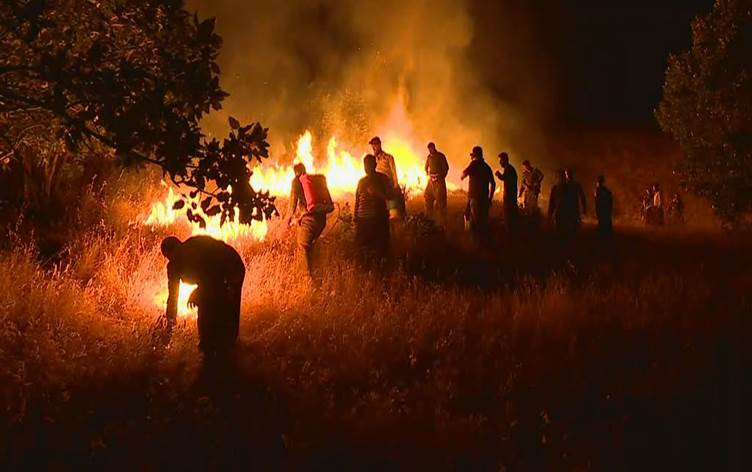Kurdistan


Locals in Sulaimani province's town of Gapilon, attempt to extinguish a wildfire that has ripped through the area for the past two days. Photo: Rudaw TV
prev
next
ERBIL, Kurdistan Region – Civil defence teams are having trouble controlling a major wildfire that has ripped through areas of northern Sulaimani province’s Sharbazher district over the past two days.
"The civil defense fire fighting teams from Mawat and Gapilon are trying to bring the fire under control and are constantly on the line," Shaho Osman, mayor of Sharbazher district, told Rudaw, adding "locals and firefighting teams are attempting to create a firebreak in order to stop the blaze from travelling further."
Fires are common in the Kurdistan Region's summers, when temperatures reach 50 degrees.
Osman warned that if the fire is not extinguished Tuesday night, they will need the Sulaimani governorate to dispatch firefighting helicopters.
The mayor fears the fire may reach the nearby mountains, which according to him, would be “extremely difficult to control” being littered with landmines.
“We cannot risk sending the civil defense personnel to them," he added of the hazardous areas.
Kamaran Abdulla, mayor of Gapilon says, "it has remained unclear to us so far what the main source of the fire is, but there are rumors that a lightning strike which was followed by light rainfall two days ago was the cause."
"A massive amount of wild brush, oak trees and bushes have caught fire in the region," he said.
"One of the reasons that we have not been able to control it is that we do not have enough staff and firefighting teams in Gapilon," he added.
Barham Abubakir, a local, claims that the fire originated from a lightning strike.
"The fire has become very large," Abubakir said. "If it remains uncontrolled, the fire will reach Kuna Masi as well," he added.
Kuna Masi is located 7.5 kilometers west of Gapilon.
A countless number of unexploded landmines and explosive ordinances are scattered across the Kurdish areas of Iran and Iraq, the legacy of a devastating war between the two countries in the eighties.
Dozens of people including children are maimed or killed every year in both countries as a result of stepping on these hazards.
"The civil defense fire fighting teams from Mawat and Gapilon are trying to bring the fire under control and are constantly on the line," Shaho Osman, mayor of Sharbazher district, told Rudaw, adding "locals and firefighting teams are attempting to create a firebreak in order to stop the blaze from travelling further."
Fires are common in the Kurdistan Region's summers, when temperatures reach 50 degrees.
Osman warned that if the fire is not extinguished Tuesday night, they will need the Sulaimani governorate to dispatch firefighting helicopters.
The mayor fears the fire may reach the nearby mountains, which according to him, would be “extremely difficult to control” being littered with landmines.
“We cannot risk sending the civil defense personnel to them," he added of the hazardous areas.
Kamaran Abdulla, mayor of Gapilon says, "it has remained unclear to us so far what the main source of the fire is, but there are rumors that a lightning strike which was followed by light rainfall two days ago was the cause."
"A massive amount of wild brush, oak trees and bushes have caught fire in the region," he said.
"One of the reasons that we have not been able to control it is that we do not have enough staff and firefighting teams in Gapilon," he added.
Barham Abubakir, a local, claims that the fire originated from a lightning strike.
"The fire has become very large," Abubakir said. "If it remains uncontrolled, the fire will reach Kuna Masi as well," he added.
Kuna Masi is located 7.5 kilometers west of Gapilon.
A countless number of unexploded landmines and explosive ordinances are scattered across the Kurdish areas of Iran and Iraq, the legacy of a devastating war between the two countries in the eighties.
Dozens of people including children are maimed or killed every year in both countries as a result of stepping on these hazards.








Comments
Rudaw moderates all comments submitted on our website. We welcome comments which are relevant to the article and encourage further discussion about the issues that matter to you. We also welcome constructive criticism about Rudaw.
To be approved for publication, however, your comments must meet our community guidelines.
We will not tolerate the following: profanity, threats, personal attacks, vulgarity, abuse (such as sexism, racism, homophobia or xenophobia), or commercial or personal promotion.
Comments that do not meet our guidelines will be rejected. Comments are not edited – they are either approved or rejected.
Post a comment